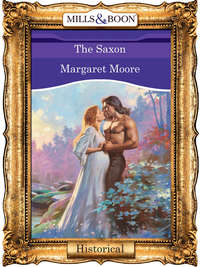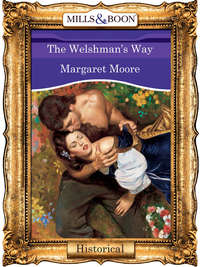
Полная версия
A Warrior's Bride
Nevertheless, she didn’t want to talk about her future with an audience, so she lifted her brows and said, “Is it not nearly time for the changing of the guard? And should not some of you be cleaning your weapons? If my father sees even a hint of rust...”
She did not have to say more, for the men quickly grabbed their accoutrements and went out, bowing their farewells.
“I’m thinking of having my old blade mended instead of going to the expense of a new sword,” Rufus said meditatively as he hung his sword belt on a peg.
“What?” Aileas cried, her hands on her hips. “That’s stupid! It’s been mended so much, it’s sure to snap any day now.”
“It’s expensive to have a new sword made. Besides, the handle of my old one fits my hand perfectly.”
Aileas realized she didn’t want to get involved in a discussion on the merits of new weapons versus old, familiar ones. “What about Sir George? What if my father insists that I marry him?”
Rufus threw himself down on the first straw pallet he spied and gave her a quizzical look. “Isn’t he the one been neglecting his duties all these years?”
“Yes!”
“Then why would your father want you to marry a reckless puppy like that?”
“Because our lands join.”
“Well,” Rufus said, making a pillow of his hands and lying back so that he was looking at the beams in the ceiling, “you would be the lady of a great estate. You could do much worse.”
For a moment, Aileas was very tempted to kick him. Didn’t he realize she thought he was the perfect man, the perfect warrior? He would be the perfect husband, too.
How blind could a grown man be?
“I saw him. On the road,” she revealed scornfully as she sat cross-legged on a nearby pallet. “I’m sure he’s as vain as ever. You should see his tunic. It’s embroidered He probably cries if he spills anything on it.”
Rufus chuckled companionably. “I can hardly wait to meet him.”
Aileas could hardly wait for Rufus to meet him, too.
Then he would see that she could never marry a man like Sir George de Gramercie.
Chapter Two
As far as George could tell, nothing at all had changed at Dugall Castle in the years he had been away. The grimly gray stone walls were still thick and imposing, and the soldiers guarding the gates still numerous and watchful, as if a horde of enemies might suddenly sneak out of the moat and attack.
Inside, there was not an animal, bale of hay, barrel or stick out of place. Several men were engaged in swordplay or practising their technique with mace and chain. Even the servants seemed to bustle about in a curiously military manner, and not a one of them was female.
Far from making George feel secure and safe, it was as if the castle were under seige, with all the women safely sent away. Indeed, everything about Dugall Castle seemed to give the place a curious sense of tension and impending doom that George did not like.
The surrounding village also had this air of suppressed anticipation, which was quite unnecessary, given the general peace in the land and the amiability of Sir Thomas’s neighbors.
As George dismounted and handed his reins to a page who trotted out to meet them, he suddenly realized that he could feel insulted, or even threatened, by this castle’s battle-ready state, until he considered the squalor of some noblemen’s castles. Here, everything was neat and exactly where it should be, which was not usually George’s experience of households where men were on their own, without women to organize their domestic comforts.
Sir Thomas himself marched out of the great hall almost at once. Though his neighbor’s face was marked by several scars of battle and tournament, his bearing was still erect, and his gaze still as piercing as a hawk’s. As usual, he wore a surcoat exactly like the one he had donned years ago when he went on Crusade.
In fact, as George noted the several clumsily mended rents and the distinctly gray tinge to the white fabric that comprised the majority of the overgarment, he realized that perhaps this was the very one. Under that was a coat of very fine chain mail, polished to gleaming perfection. Sir Thomas wore no gloves, despite the cold, exposing gnarled, chapped hands, which George didn’t doubt could still level a man with one blow or maintain a grip on any weapon for hours.
He had always made George feel like a naughty little boy. Fifteen years, it seemed, were not enough to erase that sensation.
Sir Thomas halted and briskly took his guest by the shoulders to give him the kiss of greeting, his mail jingling slightly. “Welcome, Sir George,” he said, eyeing George’s soldiers over the younger man’s shoulder even as he spoke. “It is good to see you again.”
“And you, too, Sir Thomas,” George replied, wondering if his men found favor with Sir Thomas, for the old man had a keen eye for a fine soldier. He subdued the urge to ask. After all, he was an overlord in his own right now.
“Come inside and have some wine. It’s late in the day. You must have gone slowly, or else come by the north road,” Sir Thomas noted, his voice slightly condemning, with the unspoken implication that unless George had taken the longer route, the lateness of his arrival meant that he was a lazy fellow.
George reminded himself that Sir Thomas thought everyone who didn’t work as hard as he did or take his military and lordly duties as seriously must be a lazy fellow, a judgment that encompassed every other nobleman George knew.
Then he realized that Aileas must not have returned, or if she had, she had not mentioned their meeting on the southern road. Considering her own impertinent behavior, perhaps she had thought that the better course.
They entered the hall, a large, exceptionally cold room in which the vast hearth stood empty. The walls were free of tapestry or anything that could remotely be construed as decoration, and the furnishings old, worn and unembellished. There was not a single feminine attribute about the place, nor were there any soldiers or noble guests taking their ease inside.
Sir Thomas sat in the largest chair on the dais, a heavy oaken thing much carved, with no cushion upon the seat. He gestured for George to sit next to him in a chair of similar design. George complied, to his regret, for the seat was as hard, cold and comfortable as a boulder, and the carving in the back of the chair made it feel as if fifty dagger points were digging into his back.
“How is Lady Aileas?” George inquired politely, deciding that if she had not thought fit to mention their meeting, neither would he. “I had hoped to greet her when I arrived.”
Sir Thomas made a dismissive grunt. “She’s healthy as that horse of hers. Took him out for a gallop. They’ll be back soon.”
Although George knew Sir Thomas was not a man given to emotional display—or. indeed, display of any kind—the perfunctory tone of his reply startled him nonetheless, especially when George recalled that Aileas had apparently been riding alone. “She is a skilled horsewoman, I’m sure,” he ventured.
“Best I ever saw. Taught her myself,” Sir Thomas bragged. “Better even than her brothers, and they’re excellent.”
Not excellent enough to keep from getting thrown and abandoned, George thought. “I daresay she likes a lively horse.”
A cowed-looking page boy appeared in a doorway George suspected led to the kitchen. “Wine!” Sir Thomas barked, and the lad quickly disappeared. “Lively, did you say?” his host continued. “That stallion of hers is the very devil of a horse. I told her she’ll break her neck, but she won’t listen to me. Too strong willed.” For all the apparent condemnation of his words, his tone was distinctly boastful.
“She has an escort, I presume?” George asked, certain the answer would be no and beginning to wonder if Aileas had met with another accident on the journey home.
“Escort?” Sir Thomas replied with a harsh caw of a laugh. “She’d lose ’em in a thunderclap if she did. Prefers to ride alone. Always has. As long as she stays on my land, she’s safe.”
“Of course,” George said, not willing to point out that outlaws and brigands often didn’t respect a lord’s borders, and the sight of a young woman alone would be tempting for such men.
Sir Thomas continued to peer angrily at the kitchen doorway. “Where the devil’s the wine?” he bellowed, then he turned his fierce gaze on George. “She’s like her mother, that one. See this scar?” Sir Thomas pointed at a small, crescent-shaped mark on his forehead. “Her mother gave me this the first time I tried to kiss her.” His bushy gray eyebrows lowered ominously while the rest of his face remained immobile. “Aileas would do worse to any man who took liberties.”
“Naturally,” George replied nonchalantly.
Sir Thomas leaned back in his chair. Undoubtedly chain mail made that possible. The page boy arrived with a carafe of wine and two plain silver goblets into which he poured the burgundy beverage, his hands trembling all the while. Sir Thomas said nothing, but George smiled with kindness when the boy glanced at him.
The boy finished his task without any response, then quickly moved to the side of the room, where he proceeded to stare at the men as they drank. George suspected that the lad had absolutely no interest in anything passing before him except the necessity of refilling the goblets when necessary.
“Pity about your father,” Sir Thomas remarked after taking a gulp of wine.
George took a sip of the surprisingly fine wine and steeled himself to discuss that particular subject. “Yes. He was a good man.”
“A good neighbor. Little lax, perhaps, but good for all that.”
George forced a smile onto his face.
“Sir Richard Jolliet still the estate steward?”
“Yes, and his brother, Herbert, is the household steward. Richard has just gone to London to answer some questions about the taxes on my property.”
“Not trouble with the exchequer, I trust?” the old man asked suspiciously.
“Not a bit. I may have to pay a little more this year, that’s all. My estate has been doing rather better than expected.”
“Ah! Glad to hear it. It was a hard winter, but those of us who were prepared weathered it easily enough.”
George nodded his agreement, although he doubted anybody would ever be as prepared as Sir Thomas for bad times. His father always said that Sir Thomas lived in anticipation of a repetition of the biblical seven years of famine.
“Good men, the Jolliets,” Sir Thomas continued with a hint of approval. “Trustworthy.”
“Absolutely.” George agreed.
“No doubt your father’s affairs were in excellent order.”
“Yes, Sir Thomas.”
“Too bad you couldn’t get home sooner.”
“I came as quickly as I could,” George said. Then he chose the one excuse for his delayed arrival at his father’s deathbed that Sir Thomas could understand, and that would surely put an end to this painful topic, which he had no desire to discuss with near strangers—or anyone else, for that matter. “I was dutybound to stay with Baron DeGuerre until after Candlemas.”
Sir Thomas nodded and took another gulp. “Still, a pity.”
George sipped slowly and tried not to be annoyed by Sir Thomas’s unforgiving, judgmental tone.
“So, you want to marry Aileas,” Sir Thomas announced suddenly.
George nearly choked. “I have decided to marry,” he replied truthfully.
“Why Aileas?”
It had not seemed to occur to Sir Thomas that there might be other ladies George could marry. “My father thought she would be a good choice for me,” he answered honestly.
“She doesn’t get any land when she marries,” the older man declared.
“I would not ask you for any.” Knowing better, he thought wryly.
“Good. She does get a dowry, of course. Movable goods.”
“Delightful—but of course, the true prize will be Aileas herself.”
Sir Thomas stared at George as if he had suddenly started to speak Greek. “Save that kind of nonsense for her, boy, although she’ll probably laugh in your face,” he growled. “She is a prize, as I well know. Especially if you’re ever under seige. Give her a bow and send her to the battlements, and you’ll be glad you did.”
George prevented himself from saying that he would never, ever, send a woman to the battlements, and certainly not his wife. “I’m sure she is a worthy woman.”
“Aye, she is.” Sir Thomas leaned forward, his back still absolutely straight, and fixed his hawklike gaze on George. “I’ll be honest with you, George, because I always liked your father. I hope she takes you, but if she says no, that’ll be the end of it.”
“I would not have any woman feel she is being compelled to marry me against her will,” George replied, some of his annoyance creeping into his eloquent voice.
Then Aileas entered the hall. George was pleased to see her present and unharmed, although despite the presence of guests, her hair was just as disheveled and she wore the most bizarre combination of male and female clothing George had ever seen.
Her shirt beneath the short leather tunic was definitely rough homespun. The sleeves of her undergarment, from wrist to elbow, were wrapped in leather thongs of the type favored by archers. Her skirt was too short, revealing—to his astonishment—men’s breeches, as well as boots thick with mud, which she took no pains to dislodge before marching toward them.
That was not all that made George stare at her. For one thing, although he thought he detected a sparkle of mischief in her eyes, she actually seemed subdued. Perhaps that was explained by the repressive presence of Sir Thomas.
Or that of the brawny brute of a fellow with a florid face and red hair accompanying her. He was the type of man, George thought, who probably subsisted entirely on ale and underdone beef.
Then he saw her cast a surreptitious glance at her companion and a secretive little smile played about her lips.
Could it be that she cared for this lout, who looked as if he were totally unacquainted with the concept of soap, let alone its use?
And who was also ignoring her, staring instead at her father’s guest in a manner so blatantly rude, George was exceedingly tempted to draw his sword and show the oaf the error of his ways.
Reflecting that this might not endear him to Sir Thomas and Aileas, who were, regardless of whatever else they might become in future, his neighbors, he refrained and assumed his most cool, unruffled demeanor. If Aileas Dugall wanted this red-haired ruffian, he would gladly take his leave and search elsewhere for a bride.
“Daughter, this is Sir George de Gramercie,” Sir Thomas announced. “Sir George, Lady Aileas.”
“Welcome, Sir George,” the young woman replied politely, with not one sign that they had met earlier that day. Nor did she curtsy, even when George bowed.
When he rose, he smiled at her with his most charming and meaningless smile, the one he usually reserved for empty-headed nobles in the royal court.
Her eyes narrowed ever so slightly as she straightened her shoulders defiantly. “This is Rufus Hamerton,” she declared, pointing at the red-haired fellow, who managed something like a bow. “Sir Rufus Hamerton,” she amended.
George smiled at him, too.
Aileas had never seen such a bland smile, so distinctly at odds with the shrewd intelligence burning in his blue eyes and the subtle derision there. Did he think her a fool that she wouldn’t note the disparity? And why did he say nothing about meeting her before? Surely he recognized her.
Was he being chivalrous, thinking her father would be angry at her little joke? She eyed Sir George again, suddenly certain she had not fooled him one bit, either here or on the road. He had known exactly to whom he was talking—and yet he had accused her of having a lover! How dare he, the vain, overdressed—
Rufus shifted beside her.
If Sir George had thought to say such an outrageous thing back on the road, shouldn’t he be wondering about Rufus? she thought angrily. Shouldn’t he be a little curious? Or did he assume she was sitting about like other useless young ladies of wealth and nobility, waiting for any knight capable of movement to offer. marriage?
And how was it he seemed so lazy and strangely insipid here, compared to the gracious, yet masculine, warrior on the road?
“Fetch two more goblets,” Sir Thomas ordered the page, who jumped to obey immediately. “Sit down, Rufus. Aileas, join us.”
A silence ensued as the boy returned with the required goblets and nervously poured out the wine, then scurried back to a corner.
“You remember Sir George, Aileas?” Sir Thomas demanded.
“Yes, Father, I do,” she replied. She gave their guest a sidelong glance and watched as he drank his wine elegantly, his long, slender fingers lightly holding the stem of the goblet. Every other man of her acquaintance clutched a goblet as he would a weapon.
“You’ve been gone a long time,” Rufus observed before reaching for his wine and downing a large gulp, his swallows distinctly audible.
“Yes. I’ve been serving the Baron DeGuerre,” Sir George drawled languidly. “When I was called home, I had no idea my father’s condition was so serious. He was ill quite often. Indeed, after he seemed to have passed away, I pressed my dagger to his fingertip just to ensure that the priest hadn’t made a mistake. My father was, however, completely and utterly dead.”
His tone was so matter-of-fact and his smile so continuously banal, Aileas didn’t know what to make of him. Rufus simply stared at him, dumbfounded, and Sir Thomas’s expression was nearly as stunned.
“I’m sure you will agree, Sir Thomas, that I would have been negligent in my duty to the baron if I came home too soon. You would not want your sons, whom I understand are all from home in the service of various and sundry noble lords, to rush to your bedside unless you were in imminent danger of dying.”
Sir Thomas cleared his throat. “No, no, I wouldn’t.”
“I didn’t think so. Now, if you will be so kind as to show me where I am to sleep, I believe I should retire and change for the evening meal, which I’m certain will be absolutely delightful.” He ran an appraising gaze over Rufus. “And I think I should wash.”
“Yes, yes, as you wish,” Sir Thomas muttered. “You there!” He snapped his fingers at the page boy, who once again ran forward. “Take Sir George to the bedchamber in the west tower.”
The boy nodded and bowed, and Sir George rose. “Separate sleeping quarters for guests?” he inquired lightly. “How modern.” He made a deep and graceful obeisance. “Sir Thomas, I thank you for your kind welcome. Sir Rufus, good day. Lady Aileas, a pleasure. I look forward to seeing you at supper.”
Aileas watched Sir George stroll away. The moment he disappeared from sight up the curving stone stairway leading to the upper tower, she turned toward her father. “How could any man speak so of his father’s death?” she demanded.
Sir Thomas didn’t answer right away. Indeed, Aileas suspected he, too, was wondering what kind of man he had invited into his castle, for there was a singularly incredulous look on his face. Then he cleared his throat and his face resumed its usual stern expression. “He has been gone for many years. He has indeed been in the service of Baron DeGuerre.”
Aileas was even more confused. She knew enough of the baron to realize that he wouldn’t countenance having a buffoon in his company for long.
Rufus smirked at Aileas, then turned a carefully interested eye on her father. “Who would condone having such a fool near him?” he mused aloud.
“He was the best fighter to come out of this country, save for my sons, of course. Don’t be deceived by his lack of size. He’s thin, but he’s wiry—and quicker on his feet than any man I’ve ever seen.”
“Quite frankly, Father, I find it difficult to believe he was ever anything but what we have just seen.”
“That’s where you’d be wrong,” Sir Thomas growled. “George is no fool, whatever he may seem.” Her father set down his wine. “Rufus, see that the men are told the watchword for tonight. It’s alliance.”
Rufus rose and bowed to them both before striding from the hall.
Aileas rose to leave, too, until her father ordered her to sit back down and regarded her with a speculative gaze. “What do you think of him for a husband?”
“He will do very well—for someone else,” Aileas replied bluntly.
“I want you to marry him.” It was not a wish or an opinion. It was a command. “His lands border ours, and he is a great favorite of DeGuerre,” her father reminded her unnecessarily and before she could speak. “He’s a rich man, with powerful friends, despite what he seems.”
Aileas’s hands balled into fists and she raised her eyes defiantly. “Father, I just thought—”
“You just thought? Did I ask you what you just thought? Granted the fellow’s gone a little soft, perhaps, but that can change. A few weeks here, and he’ll be what he was.”
“Yes, Father.”
“It is up to me to decide who you will marry. Remember that, Aileas.”
“Yes, Father.”
“You will wear your best gown tonight, and you will accord Sir George the courtesy his rank deserves,” Sir Thomas ordered.
“Yes, Father.”
His tone softened ever so slightly as he said, “Now you may go.”
Aileas gave no indication of her feelings as she left the hall, but she hurried to where Rufus would be speaking with the guards. She waited beside the gate until he came out of the gatehouse, then grabbed his arm and pulled him into the shadows. “He’s ordered me to marry him!” she declared. “As if I were a chitd!”
Rufus looked down at the angry young woman and suddenly realized that they were speaking of an event that was very likely to occur. What Sir Thomas ordered always came about.
Even his daughter’s wedding, Rufus assumed.
It had to happen sometime, of course. He had known that for years, in an abstract sort of way, although he had never seriously considered the matter, just as he rarely even considered Aileas a woman. She was more like a squire or page to him than a woman.
Now that he was forced to think of her as a marriageable female, he realized that he would be very sorry to lose such a friend.
Aileas married. To that peacock Sir George.
“What do you think of him?” he asked quietly. It would be worse if she was forced to marry someone she couldn’t even respect, let alone like.
“He’s very well dressed,” she said scornfully.
“Your father says he’s a good fighter.”
“I will believe that when I witness it for myself.”
“He does have powerful friends.”
“So do jesters.”
“He’s rich.”
“He won’t be for long if he continues to spend so much on his clothes.”
“Do you truly believe your father will force you to marry him?”
Aileas’s steadfast gaze did not falter. “Unless someone better asks for me first.”
Chapter Three
Suddenly Rufus felt sick, for there could be no mistaking the significance of Aileas’s words or the unexpected yearning in her eyes.
She wanted him to ask for her.
But he could never marry Aileas. Indeed, the idea had never occurred to him in all the years he had lived at Dugall Castle. If it had, it would have seemed preposterous. He would as soon consider marrying Sir Thomas as he would his daughter.
Rufus wanted a womanly woman, a soft, tenderhearted creature who would soothe his brow when he was anxious, not offer to wrestle. A woman who would serve him his food and drink and anxiously await his opinion on their merits, not someone who wolfed down bread, meat and ale like a starving foot soldier. A woman who could do her best to soften his anger, not tell him to stop acting like a spoiled brat. Who would defer to him as head of the household, not answer back impertinently. Who would be pliant and loving and welcoming in bed.
Aileas do any of those things? He couldn’t even imagine it. And especially not in bed. Why, it would be like...like sleeping with a younger brother. At that thought, it was all he could do to keep the disgust from his face. “I... I have other duties to attend to,” he stammered as he backed away, then turned and hurried off.








